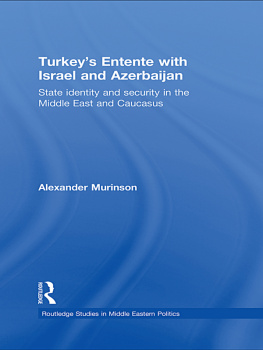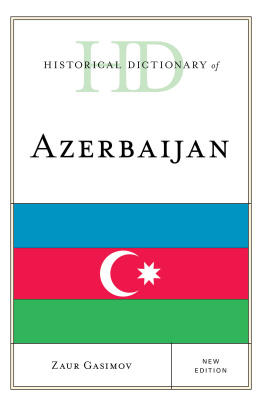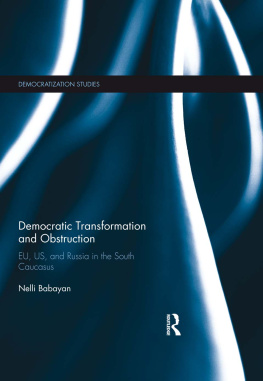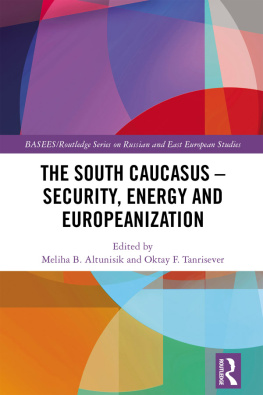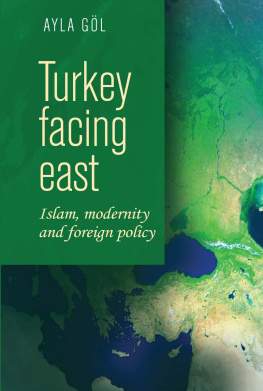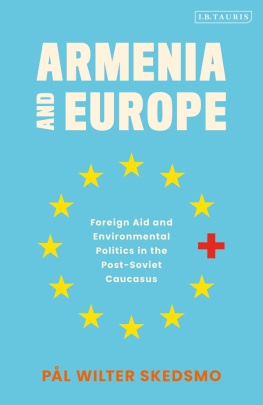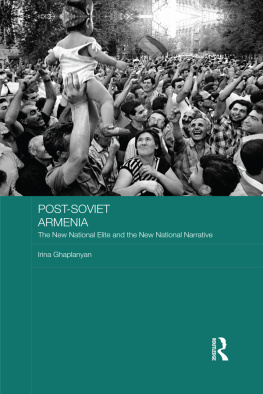
Irans Foreign Policy in the South Caucasus
Irans role as a regional power is more significant than many in the West may realize. The country lies between Central Asia/the Caucasus and the Gulf region, on the one hand, and, on the other, between the Mediterranean/Levant region and South Asia. Many of these areas are of increasing strategic importance. This book explores Irans role as a regional power, focusing on relations with South Caucasus countries the Republics of Azerbaijan and Armenia. It outlines the historical context, including Persias rule of these countries before the nineteenth century and discusses Irans approach to foreign and regional policy and how both internal and international factors shape these policies. The book assesses IranAzerbaijan and IranArmenia bilateral relations to demonstrate how those policies translate in Irans regional and bilateral relations. The book concludes by considering how Irans relations in the region are likely to develop in the future.
Marzieh Kouhi-Esfahani is a Teaching Fellow in the School of Government and International Affairs at Durham University.
Durham Modern Middle East and Islamic World Series
Series Editor: Anoushiravan Ehteshami
University of Durham
Lebanon and the Arab Uprisings
In the Eye of the Hurricane
Edited by Maximilian Felsch and Martin Whlisch
The Erasure of Arab Political Identity
Colonialism and Violence
Salam Hawa
Chinas Presence in the Middle East
The Implications of the One Belt, One Road Initiative
Edited by Anoushiravan Ehteshami and Niv Horesh
Afghanistan Challenges and Prospects
Edited by Srinjoy Bose, Nishank Motwani and William Maley
Nuclear Politics in Asia
Edited by Marzieh Kouhi Esfahani and Ariabarzan Mohammadi
Transition in Afghanistan
Hope, Despair and the Limits of Statebuilding
William Maley
Russias Middle East Policy
From Lenin to Putin
Alexey Vasiliev
Irans Foreign Policy in the South Caucasus
Relations with Azerbaijan and Armenia
Marzieh Kouhi-Esfahani
For a full list of available titles please visit: www.routledge.com/Durham-Modern-Middle-East-and-Islamic-World-Series/book-series/SE0526
Irans Foreign Policy in the South Caucasus
Relations with Azerbaijan and Armenia
Marzieh Kouhi-Esfahani
First published 2019
by Routledge
2 Park Square, Milton Park, Abingdon, Oxon OX14 4RN
and by Routledge
52 Vanderbilt Avenue, New York, NY 10017
Routledge is an imprint of the Taylor & Francis Group, an informa business
2019 Marzieh Kouhi-Esfahani
The right of Marzieh Kouhi-Esfahani to be identified as author of this work has been asserted by her in accordance with sections 77 and 78 of the Copyright, Designs and Patents Act 1988.
All rights reserved. No part of this book may be reprinted or reproduced or utilised in any form or by any electronic, mechanical, or other means, now known or hereafter invented, including photocopying and recording, or in any information storage or retrieval system, without permission in writing from the publishers.
Trademark notice: Product or corporate names may be trademarks or registered trademarks, and are used only for identification and explanation without intent to infringe.
British Library Cataloguing-in-Publication Data
A catalogue record for this book is available from the British Library
Library of Congress Cataloging-in-Publication Data
A catalog record for this book has been requested
ISBN: 978-1-138-30908-1 (hbk)
ISBN: 978-1-315-14326-2 (ebk)
Typeset in Times New Roman
by Apex CoVantage, LLC
In the Name of God The Compassionate the Merciful
This manuscript is dedicated to:
My husband, Dr Hamid Riahi, whose love and unwavering support made this possible for me, and my daughters,
Yasaman and Nastaran,
who encouraged me and walked patiently along this path with me.
Contents
The literature on the Islamic Republic and its international relations has turned into a cottage industry; much attention has been, and is being, paid to Irans relations with the Middle East and North Africa region and its southern, eastern and western neighbours. Details of Irans relations with its Arab neighbours have been dissected many times, and work on relations between Iran and its eastern neighbours (Afghanistan and Pakistan) is growing. But in all this substantial body of knowledge about Iran and its foreign policy and international relations, we seem to have suffered from a collective black spot, in that scholarship on Irans interactions with its Caucasian neighbours to the north is largely missing. So, it was with great relief that I was able to persuade Marzieh Kouhi-Esfahani to allow us to consider her rich study for publication in my series. This book is substantial in every way. It provides a conceptual context for studying Irans northern glance, a framework for analysing its interactions with its northern neighbours in the Caucasus and a shedload of data as the necessary contours for understanding the drivers of Irans policies and its role and presence in this region. In English, certainly, this volume will no doubt be a benchmark, and I am immensely pleased that we are able to publish Dr Kouhi-Esfahanis landmark study of Irans foreign policy in the South Caucasus. With this work, we certainly have filled a gaping void in our understanding of Irans relations with its northern neighbours. Lets hope that this book will stimulate further scholarship on the Caucasus and on the role that traditional Middle East countries are beginning to play in this emerging region, squeezed between the role of the major powers and the interests of the middle powers.
Professor Anoushiravan Ehteshami
The aim of this study is to provide a comprehensive understanding of Irans foreign policy and behaviour, roots of continuity and factors of change in the regional context of the South Caucasus, using the case studies of its relations with two important neighbouring countries: the Republics of Armenia and Azerbaijan.
To offer a picture of the regional geopolitical context in which the subject is examined, the study discusses the importance of the South Caucasus in the international system and introduces the existing challenges and opportunities in the region, as well as important regional and international players involved, their goals and their policies towards those goals.
The study also provides a review of Irans foreign policy in different periods and discusses factors resulting in different approaches undertaken in each period. The implication of these policies is then examined further in the context of the Middle East as well as the South Caucasus. This is to demonstrate the specific strategies Iran has taken in each of these regions and to explain differences between its Middle East policies and those of the South Caucasus. Case studies provide a more detailed picture of how regional policies work and what factors shape the bilateral relations.


